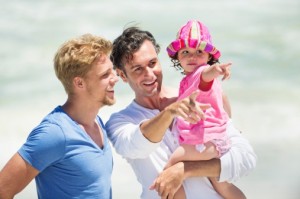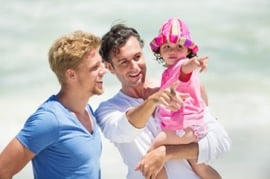
Adoption is an Option for Gay & Lesbian Families
There are many ways for gay men and lesbians to build families. Last month, we examined third-party options. This month we’ll look at adoption.
Organizations like Family & Children’s Agency in Norwalk, Connecticut help prospective adoptive parents understand the process and programs available. For example, international and domestic adoptions differ in important ways.
“In our experience, international agencies are less open to gay and lesbian parents than in the U.S.,” says Mary Kate Locke, director of adoptions and prevention services at Family & Children’s Services.

“Different adoption agencies also set different requirements, in terms of the age of the parents, health status and marital status. We help families understand what’s out there, and what the best fit is for their particular circumstances.”
Locke’s agency, like others, works with pregnant women to help devise an action plan. Birth mothers examine profiles, from a list of parents already licensed to adopt. Profiles include photographs, information about themselves, and an explanation of why they want to adopt. Birth mothers then select the family they feel most comfortable with.
An agency like Locke’s helps adoptive parents, as well as birth mothers, with legal paperwork. The agency can appear in court as the birth mother terminates legal rights, then help the new parents navigate through the adoption process.
Gay and Lesbian Parents May Be Able to Adopt Through the State
Gay and lesbian parents can also adopt through a state’s department of children and family services. Laws vary by state. Some embrace gay parents; others prohibit them. Some states allow only one partner – not both – to be the legal parent.
Locke says that adoptive parents are able to explain to their child what an honor it was for them to have been chosen by the birth parent to care for a child she was unable to raise on her own.
However, Locke notes, an adopted child may not look anything like the adoptive parents. They may even be of different races. So beyond having two mothers or two fathers, an adopted child feels that difference too. It is important for parents to tell the “adoption story” to a child, to reinforce his or her sense of “specialness.”
Gay men and lesbians who adopt through a foster care agency may parent a child who has been neglected, abused or otherwise traumatized. “There are lots of challenges,” Locke notes. “But it’s also a tremendous opportunity to impact a child’s life.”
“Families can be built in many ways,” she adds. “Whether it's through adoption or surrogacy, both parents must feel in their heart and gut that the option they choose is the right way for them.”
Dan Woog is a writer, educator and LGBT activist. He has written 17 books. Subjects include LGBT issues in gay education and the workplace, gay male athletes, and the importance of straight allies. He is also a co-founder of OutSpoken, Fairfield County’s support group for LGBT youth.
